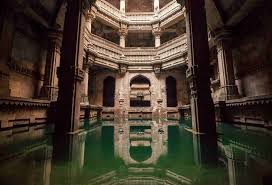來源于《圖書和藝術(shù)》版塊
Conservation in India
印度的保護(hù)
Liquid assets
流動資產(chǎn)
India’s neglected but magnificent stepwells are relics of a nuanced history
印度被忽視但宏偉的階梯井是一段微妙歷史的遺跡
The story goes that devout followers of Nizamuddin Auliya, a Sufi saint who lived from 1238 to 1325, had already begun work on his baoli or stepwell when Ghazi Malik, the new sultan of Delhi, ordered all projects to stop until the construction of an impregnable citadel for him was finished. Out of adoration for Nizamuddin, the labourers worked on the fortress by day and the baoli by night. Enraged, Ghazi Malik banned the sale of oil for lamps—whereupon Nizamuddin blessed the well’s water and told his followers to use that instead. Miraculously, it burned.
據(jù)說尼扎穆丁·奧利亞的虔誠追隨者,是一位生活在1238年至1325年之間的蘇菲派圣人,當(dāng)?shù)吕锏男绿K丹加齊•馬利克下令停止所有項目,只為他建造一座堅不可摧的城堡,這位追隨者就已經(jīng)開始他的baoli或稱之為階梯井的工作了。出于對尼扎穆丁的崇拜,工人們白天在堡壘上干活,晚上在為baoli干活。憤怒的加齊·馬利克下令禁止銷售油燈,于是尼扎穆丁為井水祈福,并告訴他的追隨者改用井水。奇跡般地,竟也能燃燒。

Today, Nizamuddin remains one of South Asia’s most admired Sufi saints. His message of tolerance and humanity appeals in an age when political leaders preach communal division. Not just Muslims but Hindus, Sikhs and Christians flock to his dargah, or shrine, in New Delhi, where qawwali songs of devotion are performed. Thousands crowd every day down the narrow, beggar-lined passageway that runs alongside the baoli on their way to strewing rose petals on the holy man’s tomb. Many pilgrims believe in the healing power of the baoli water.
今天,尼扎穆丁仍然是南亞最受尊敬的蘇菲派圣人之一。在當(dāng)今這個政治領(lǐng)導(dǎo)人鼓吹社會分裂的時代,他所傳遞的寬容和人道的信息頗具吸引力。不僅是穆斯林,印度教徒、錫克教徒和基督徒也紛紛涌向他在新德里的達(dá)迦或圣地,在那里人們唱著qawwali敬拜之歌。每天都有成千上萬的人擠在包麗河邊狹窄的、沿街乞討的過道上,他們要把玫瑰花瓣撒在圣人的墳?zāi)股稀TS多朝圣者相信baoli水的治療作用。
Until recently that water was filthy. The tank was full of rubbish; the neighbourhood’s raw sewage flowed into it. Worse, the structure, which is more than 160 feet (49 metres) deep, was in an advanced state of dilapidation. One section of its walls of grey Delhi quartzite had collapsed. Other parts were bulging alarmingly—and, for the dozens of families who had built homes atop them, perilously.
而之前那里的水都很臟,直到最近才有所好轉(zhuǎn)。水箱里裝滿了垃圾;社區(qū)里未經(jīng)處理的污水流入其中。更糟糕的是,這座超過160英尺(49米)深的建筑已經(jīng)處于破損的晚期。其中一段灰色的德里石英巖墻已經(jīng)倒塌。其他部分也在驚人地膨脹——對于那些在上面蓋房子的幾十個家庭來說,這是非常危險的。
譯文由可可原創(chuàng),僅供學(xué)習(xí)交流使用,未經(jīng)許可請勿轉(zhuǎn)載。












